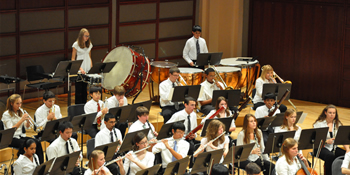This Eastern Music Festival concert, which benefitted from the fine acoustics of Guilford College‘s Dana Auditorium, featured one of the two full all-student orchestras, under conductor José-Luis Novo. Two rarely-performed symphonic tone poems sandwiched a Romantic piano concerto featuring a very able faculty soloist.
Psyché et Eros (1887-88), a late work by César Franck (1822-90), opened the concert. The virtuoso organist and composer was inspired by an ancient Roman story recorded by Lucius Apuleius Madaurensis in Metamorphoses. The plot involves a love affair between the mortal Psyché and Eros, the immortal son of the goddess Aphrodite. After many tribulations, Jupiter officiates their marriage and elevates Psyché to Olympus. Its three parts are: Allegro vivo (Introduction: Psyché awakened), Allegretto modere (The union of the lovers), Finale (Psyché’s punishment and soft finish representing her redemption).
Novo guided his student musicians in a perfectly graduated quiet opening evoking dawn. Sectional discipline was excellent no matter how sudden the dynamic or tempo changes. String intonation and tone was superb while the woodwinds and brass were strongly characterized. Among the many fine solos were those by clarinetist Ashrey Shah, flutist Bianca Pratte, oboist Sarah Morales, and French horn player Zach Scruggs.
Next came the Piano Concerto in A minor, Op. 54 (1845), by Robert Schumann, with Marika Bournaki as the very effective soloist. Schumann struggled over some four years, eventually adding two movements to his original Phantasie in A minor for solo piano and orchestra (1841). It is in three movements: Allegro affetuoso, Intermezzo, and Allegro vivace.
While never lacking for power when apt, Bournaki’s interpretation brought out the poetic quality of Schumann’s score. Articulation was extraordinarily clear, and her attention to color and dynamics was very satisfying. Novo led his students in a finely judged accompaniment, perfectly balanced with Bournaki’s Yamaha. Important orchestral solos were given by oboist Stephanie Treat, clarinetist Jack Kartsotis, flutist Christopher Pegram, and French hornist Jean Smith.
The colorful Feste Romane (Roman Festivals) (1928), by Ottorino Respighi (1879-1936), closed the concert with barely contained orchestral fireworks. The four movements are: “Circenses” (Circuses), “Giubilo” (Jubilee), “L’Ottorbrata” (October Festival), and “La Befana” (The Epiphany). It is the least performed of Respighi’s Roman Trilogy (the other parts being Pines of Rome and Fountains of Rome). It was composed in 1928 and premiered in 1929 by Arturo Toscanini and the New York Philharmonic. If the first two of the trilogy are Impressionistic, Feste Romane is aggressively cinematic. It abounds with harsh dissonances and demanding solos. It is ideal for festival student orchestras because players must meet the demands of playing the extreme ranges of their instruments.
Novo led his musicians in a very dynamic, vivid performance with slashing rhythms, complex percussion, and strings by turns with pounding attacks and long, flowing melodic lines. Novo made the most of spatial arrangement of the orchestra. The opening was brilliant with a trio of trumpets – Abigail Rowland, Luke Randazzo, and Ryan McArthur – stationed in the right hall exit nearest the stage. Controlled cacophony in the opening movement evoked crowds at gladiatorial contests at the ancient Roman circus. Gregorian modes came across beautifully in the first and second movements suggestive of Christian martyrs in the first and the tread of pilgrims in the latter. “Giubilo” also featured fine playing from clarinetist Triniti Rives and English horn phrased beautifully by Brian Stewart. Highlights were the ringing of tubular bells and a fine French horn solo by Corey Johnson. The third movement featured an extended mandolin solo played by Kayla Williams, a 2019 String Fellow, as well as an extended turn from concertmaster Gabriella Gans. Trombonist Evelyn Proffit also had an extensive, well-played solo. The last movement is like a crazy quilt of earlier themes rushing by in an intense retrospective.
The Eastern Music Festival continues throughout the month. See our calendar for details.











